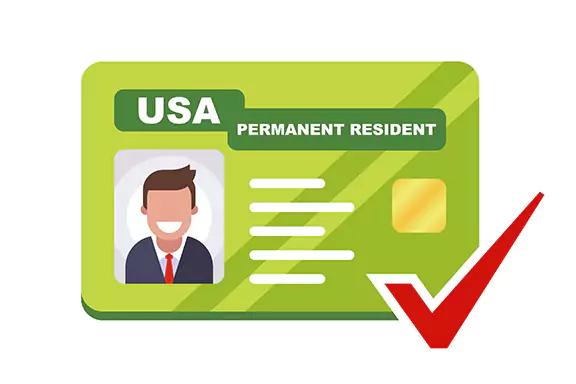The journey to becoming permanent residents in the United States is often complex and filled with various requirements and procedures. One question that frequently arises among green card holders is whether they can sponsor a family member for a green card, particularly for parents. This article covers the specifics of parental sponsorship, including eligibility, processes, and alternatives available to green card holders.
Understanding Green Card Sponsorship
A green card holder, also known as a lawful permanent resident (LPR), enjoys many rights and privileges in the United States, including the ability to live and work permanently in the country. However, their ability to sponsor a family member to become a permanent resident is limited compared to U.S. citizens.
Who Can Green Card Holders Sponsor?
Permanent residents can sponsor certain family members for immigration to the U.S., but their options are restricted. Under U.S. immigration law, permanent residents can sponsor the following relatives:
Spouses
A green card holder can sponsor their spouse for permanent residency. Applicants must have a proper marriage certificate as proof.
Unmarried Children
Green card holders can sponsor their unmarried children (with proper birth certificates as proof) under the age of 21.
Unmarried Sons and Daughters
They can also sponsor their unmarried sons and daughters over the age of 21.
However, when it comes to parents, the situation changes significantly. Permanent residents cannot sponsor their parents for permanent residency.
Sponsorship Eligibility: U.S. Citizens vs. Green Card Holders
The ability to sponsor parents for green cards is exclusively reserved for U.S. citizens. Once a permanent resident becomes a U.S. citizen through naturalization, they gain the right to file a petition to sponsor their parents. Here’s a breakdown of the eligibility requirements for both permanent residents and U.S. citizens:
For Permanent Residents
Cannot Sponsor Parents: Permanent residents are not eligible to sponsor their parents for immigration.
Limited Family Sponsorship: They can only sponsor spouses and unmarried children.
For U.S. Citizens
Can Sponsor Parents: U.S. citizens can sponsor their biological parents, adoptive parents, and step-parents.
Immediate Relative Status: Parents of U.S. citizens fall under the category of “immediate relatives,” which means there is no annual limit on the number of visas available. This generally leads to a faster processing time.
The Process of Sponsoring Parents
Once a permanent resident becomes a U.S. citizen, they can proceed with sponsoring their parents. The process involves several steps:
File Form I-130
The U.S. citizen must file Form I-130, Petition for Alien Relative, to the United States Citizenship and Immigration Services (USCIS) for each parent. This form establishes the relationship between the U.S. citizen and the parent.
Approval of the Petition
After the I-130 petition is submitted, USCIS will review it and, if approved, send it to the National Visa Center (NVC) for further processing.
Immigrant Visa Application
If the parent is outside the U.S., they will need to go through consular processing. They must complete Form DS-260, Online Immigrant Visa Application, and attend an interview at a U.S. consulate or embassy in their home country.
Adjustment of Status
If the parent is already in the U.S. on a valid visa, they may be eligible to file Form I-485, Application to Register Permanent Residence or Adjust Status, to become a permanent resident without leaving the country.
Receive Green Card
Upon approval of the immigrant visa application or adjustment of status, the parent will receive their green card.
The Waiting Period and Processing Times
While the process for U.S. citizens to sponsor their parents is relatively straightforward, it’s essential to be aware of potential waiting periods. Since parents are classified as immediate relatives, they typically do not face long wait times like other family-sponsored categories. However, processing times can still vary based on the following factors:
USCIS Processing Times
The time it takes for USCIS to process the I-130 petition can range from several months to over a year, depending on the service center’s workload.
Consular Processing Delays
If the parent is outside the U.S., additional delays may occur during consular processing, particularly in countries with high volumes of visa applications.
Alternatives for Green Card Holders
If a permanent resident wants to bring their parents to the U.S. but has not yet become a U.S. citizen, they still have some alternatives:
Visitor Visa (B-2 Visa)
Green card holders can encourage their parents to apply for a B-2 visitor visa for temporary visits. However, this visa does not allow for permanent residency, and parents must demonstrate they intend to return to their home country after their visit.
Naturalization
If a permanent resident aspires to sponsor their parents, the most effective solution is to become a U.S. citizen. The process for naturalization typically requires the green card holder to have been a permanent resident for at least five years (three years if married to a U.S. citizen) and to meet other requirements such as good moral character, English language proficiency, and knowledge of U.S. history and government.
Family-Based Immigration through Other Relatives
If parents have other family members who are U.S. citizens, they may explore sponsorship options through those relatives. For example, a sibling of the parent who is a U.S. citizen can file an I-130 petition, although this process typically takes longer.

The Steps for Permanent Residents to Become Citizens
As mentioned above, permanent residents who want to bring their parents to the U.S. can do so once they become U.S. citizens through naturalization. After obtaining citizenship, they can then proceed with the application process to sponsor their parents. Here’s a step-by-step guide to the entire process:
Step 1: Naturalization
Eligibility for Naturalization
Green card holders must meet certain requirements to apply for U.S. citizenship, including:
Being a permanent resident for at least 5 years (3 years if married to a U.S. citizen).
Demonstrating good moral character.
Passing an English language test and a civics test.
Meeting residency requirements (having lived in the U.S. for at least half of the past five years).
Complete Form N-400
If eligible, the green card holder must complete and submit Form N-400, Application for Naturalization, along with the required documents and fees.
Attend Biometrics Appointment
After submitting Form N-400, the applicant will be scheduled for a biometrics appointment to have their fingerprints taken.
Attend Interview
The applicant will attend an interview where they will be asked questions about their application and take the citizenship test.
Receive Decision
After the interview, USCIS will notify the applicant of their decision. If approved, the applicant will be scheduled for an oath ceremony.
Oath of Allegiance
Once the applicant takes the Oath of Allegiance, they will officially become a U.S. citizen.
Step 2: Sponsoring Parents
After becoming a U.S. citizen, the process to bring parents to the U.S. involves the following steps:
File Form I-130
The U.S. citizen must file Form I-130, Petition for Alien Relative, for each parent. This form establishes the relationship between the U.S. citizen and their parent(s).
Provide Required Documentation
Along with Form I-130, the following documents may be required:
Proof of U.S. citizenship (e.g., naturalization certificate, passport).
Proof of the parent-child relationship (e.g., birth certificate or adoption records).
Passport-style photographs of the parent(s).
USCIS Processing
USCIS will review the I-130 petition. If approved, the case will be forwarded to the National Visa Center (NVC) for further processing.
National Visa Center (NVC) Processing
Receive NVC Case Number: The NVC will assign a case number and send instructions on the next steps.
Pay Fees: The U.S. citizen will need to pay the required immigrant visa processing fees.
Submit Form DS-260: The parent(s) must complete Form DS-260, Online Immigrant Visa Application.
Schedule an Interview: After processing the DS-260, the NVC will schedule an interview for the parent(s) at a U.S. consulate or embassy in their home country.
Attend the Visa Interview: The parent(s) will attend a green card interview at the consulate or embassy, where they will be asked questions about their application and background.
Medical Examination: Before the interview, the parent(s) must undergo a medical examination by an approved physician.
Receive Visa: If the interview is successful and all requirements are met, the parent(s) will receive an immigrant visa, allowing them to travel to the U.S.
Enter the U.S.: Upon arrival in the U.S., the parent(s) will be processed at the port of entry and will receive their green card by mail after a few weeks.
Step 3: Adjustment of Status (if applicable)
If the parent(s) are already in the U.S. on a valid visa, they may be eligible to adjust their status rather than go through consular processing:
File Form I-485
The parent(s) can file Form I-485, Application to Register Permanent Residence or Adjust Status, after the I-130 petition is approved.
Biometrics Appointment
The parent(s) will attend a biometrics appointment to have their fingerprints taken.
Interview
USCIS may schedule an interview for the parent(s) as part of the adjustment of status process.
Receive Green Card
If everything is approved, the parent(s) will receive their green card in the mail.
Begin the Process of Sponsoring Parents
The ability to sponsor parents for green cards is restricted to U.S. citizens, who can file petitions for their parents as immediate relatives, ensuring a faster immigration process. For green card holders, the best path to sponsoring their parents is to first become U.S. citizens through naturalization. Until then, alternatives such as visitor visas may provide limited options for family visits, but these do not lead to permanent residency.
Seek Legal Advice
For individuals navigating these processes, seeking guidance from an immigration attorney or consultant can provide clarity on eligibility, timelines, and the intricacies of immigration law, ultimately making the journey toward family reunification smoother and more efficient.

